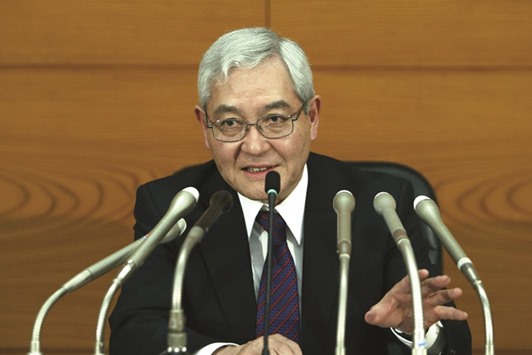Bank of Japan’s (BoJ) new board member, Makoto Sakurai, yesterday flagged strong support for governor Haruhiko Kuroda’s aggressive monetary easing and argued the case for bold policy measures to tackle deflationary challenges.
But he also said the central bank should not expand stimulus recklessly to quicken the timing for achieving its 2% inflation target, indicating that there was no pressing need for immediate measures.
“Monetary policy steps should not be deployed recklessly in small instalments,” Sakurai said. “When you need to take steps, you obviously want to do something effective so you need to take bold steps,” he said in his inaugural news conference.
The former think tank executive also said the central bank needed to develop new policy tools to use in case it needs to loosen monetary policy further.
“The more policy options the BoJ has, the easier it will be to achieve (its price target) so it’s important to develop new means,” he said, without specifying what those options might be.
While little was previously known about Sakurai’s views on monetary policy, his remarks suggest he would support governor Kuroda’s aggressive easing stance.
“Sakurai would probably support Kuroda when the governor decides to ease again to achieve his price target,” said Naomi Muguruma, senior market economist at Mitsubishi UFJ Morgan Stanley Securities.
“That said, his stance arguing against reckless easing stands in contrast to Kuroda’s approach of doing ‘whatever it takes’ to hit 2% inflation.”
The BoJ took the controversial step in January of setting negative interest rates, after nearly three years of printing money at a rate of up to ¥80tn ($712bn) a year, in a bid to rescue his floundering efforts to lift Japan clear of two decades of deflation and stagnation.
Sakurai’s addition to the BoJ board could mean Kuroda will have a more compliant board, which critics say might limit debate on his policies and leave the bank vulnerable to government pressure to bankroll public debt.
The former think tank executive also said that while Japan’s economy faces various risks, the central bank can spend some time scrutinising the effect of its past easing steps including January’s decision to deploy negative interest rates.
While risks to the economy have heightened from six months ago, the BoJ must scrutinise whether such risks have heightened enough to derail Japan’s economic fundamentals, he added, suggesting that he saw no immediate need to top up stimulus.
“Economic indicators are mixed and some indicators are showing positive signs. We need to monitor the situation to assess the state of the economy, but we don’t have to do this in a hurry,” Sakurai said.
The government last month named Sakurai, a 69-year-old think tank executive with ties to advocates of aggressive monetary policy easing, to succeed former International Monetary Fund economist Sayuri Shirai, whose term ended on March 31.

Sakurai: The BoJ should not expand stimulus recklessly to quicken the timing for achieving 2% inflation target.
